Fitness & Wellness
Aromatherapy As A Stress Reliever
Stress Reliever
A stress reliever that stimulates your nose scent receptors and signals to your brain via the nervous system is known as aromatherapy. There are various stress relievers, but aromatherapy is something easy and pleasant for you to do on a daily basis.
Essential Oils: The Core Ingredient of a Stress Reliever through Aroma?
Bark, roots, peels, and petals of flowers, herbs, and trees are used to make essential oils. The “essence” of a plant is the cells that give it its pleasant scent. Essential oil is created when a plant’s essence is extracted. Essential oils are made from a large amount of plant matter. More than 200 pounds of lavender flowers are required to make one pound of lavender essential oil. Essential oils aren’t mixed with any other chemicals or scents. They’re manufactured with a special procedure that doesn’t alter the plant’s chemistry.
Aromatherapy as a Form of Stress Reliever: How does it affect the human body?
According to experts, this kind of stress reliever activates smell receptors in your nose, which convey information to your brain via your nervous system. Certain parts of your brain, such as your limbic system, which controls your emotions, may be activated by the oils. They may also affect your hypothalamus, which may react to the oil by producing feel-good hormones like serotonin. Some experts believe that applying essential oils to your skin triggers a reaction in your skin as well as other regions of your body, such as your joints. Below are five of the most popular smells, along with suggestions for how to use them.
Is Lavender a Stress Reliever?

Yes! Lavender oil is one of the most well-known essential oils in aromatherapy, valued for its relaxing effects on the body and mind, as well as its ability to reduce anxiety. Participants were exposed to a stressor prior to performing a memory test in a study published in the Journal of Alternative and Complementary Medicine. Before being stressed, those who inhaled a lavender aroma performed better than those who inhaled a placebo aroma. Aromatherapy utilising a 3% lavender oil spray on clothing was found to be beneficial in reducing work-related stress for three to four days, according to a study published in the International Journal of Nursing Practice. Bath salts and massage oil contain lavender oil, which can be found in a range of aromatherapy items. Sipping lavender-infused herbal tea, which is available in many natural foods stores, is another way to enjoy the relaxing aroma of lavender.
Lemongrass
Some people use aromatherapy with lemongrass essential oil, which is derived from the lemongrass herb, to relieve anxiety naturally (Cymbopogon citratus). Inhaling the oil’s aroma (or applying it lightly to the skin after mixing it with a carrier oil) is known to promote relaxation and alleviate anxiety symptoms. Even though there is little research on the effectiveness of lemongrass essential oil, a 2015 study published in the Journal of Alternative and Complementary Medicine found that participants who inhaled lemongrass essential oil experienced immediate relief from anxiety and tension and recovered quickly from an anxiety-inducing situation when compared to those who inhaled a control aroma (tea tree bud).
Orange
According to a preliminary study, inhaling the sweet tangy smell of orange essential oil may help you relax. Participants who inhaled sweet orange essential oil, as opposed to those who inhaled a control aroma (tea tree oil) or a placebo, did not experience an increase in anxiety or tension during an anxiety-inducing situation, according to a study published in the Journal of Alternative and Complementary Medicine.
Chamomile
The chamomile plant, which is used in tea, is known to have sedative properties. Chamomile essential oil is no exception, as it offers calming characteristics that might help you sleep better. Chamomile essential oil is backed by scientific evidence. It’s been used for a range of ailments and disorders over the years, including stomach disturbance, anxiety, wounds, pain, and sleep issues. A small study published in Phytomedicine in the year 2016 found that when applying chamomile extract for 8 weeks, 58.1% of subjects reported reduced symptoms of moderate to severe generalized anxiety disorder. To get the relaxing effects of Roman chamomile essential oil, diffuse it or apply a few drops to your skin before going to bed.
Clary Sage

The Mediterranean basin is home to the flowering herb clary sage (Salvia sclarea). Because it can affect cortisol, the stress hormone, it’s excellent for addressing stress. Clary sage proved helpful at lowering cortisol levels and producing an antidepressant-like effect for menopausal women when inhaled, according to a 2014 study published in Phytotherapy Research. To create a relaxing influence throughout a space, diffuse this essential oil, or inhale it directly from a cotton ball or tissue. When diluted, it can also be administered straight to the skin.
Aromatherapy: How Safe This Stress Reliever Is?
This form of stress reliever is usually considered to be safe. It’s advisable to take precautions with any substance you introduce to your body. To avoid adverse reactions, essential oils must be diluted. Essential oil concentration levels should be kept below 5% as a general rule. Pay close attention to the dosage, purity, mode of application, and any potential drug interactions. Some oils are deemed safe when inhaled, but when applied to the skin in quantities as low as 3 to 5%, they can be irritating. When diffusing oils, follow the steps closely as it is diffused in a well-ventilated room. Diffuse your essential oil sporadically by taking a break from it every 30 – 60 minutes. Some essential oils can have undesirable side effects. They can irritate your eyes, skin, or nasal mucous membranes. They can also trigger mild allergic reactions in certain people. Essential oils might harm your kidneys and liver if consumed. People rarely consume essential oils by mouth, and you should only do so if your doctor approves. Work with an aromatherapist or your doctor if you’re new to aromatherapy. Keep in mind that, unlike pharmaceuticals, essential oils aren’t regulated by the FDA, which means the agency doesn’t test them to verify if they’re safe or working well. After discovering the functionality of aromatherapy, are you convinced that you need a DNA test? Learn more about how our DNA test can help you. It’s considered the most advanced DNA test in Malaysia that we can provide, so we’d like to offer you our premium DNA test. You can take advantage of this offer and reap the benefits of getting a DNA test.


